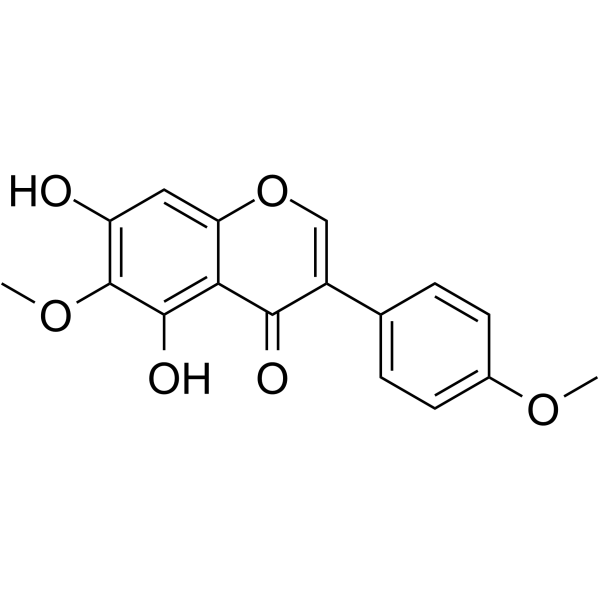天然产物 黄酮类 Flavonoids
Irisolidone (Synonyms: 尼泊尔鸢尾异黄酮) 纯度: 99.66%
Irisolidone 是葛根花中的主要的异黄酮。Irisolidone 具有较强的保肝活性。Irisolidone 对阴离子通道 VRAC 具有高效阻断作用 (IC50=9.8 μM)。

Irisolidone Chemical Structure
CAS No. : 2345-17-7
| 规格 | 价格 | 是否有货 | 数量 |
|---|---|---|---|
| 1 mg | ¥1300 | In-stock | |
| 5 mg | ¥2950 | In-stock | |
| 10 mg | ¥4480 | In-stock | |
| 50 mg | 询价 | ||
| 100 mg | 询价 |
* Please select Quantity before adding items.
Irisolidone 相关产品
•相关化合物库:
- Natural Product Library Plus
- Bioactive Compound Library Plus
- Membrane Transporter/Ion Channel Compound Library
- Natural Product Library
- Anti-Cancer Compound Library
- Medicine Food Homology Compound Library
- Phenols Library
- Traditional Chinese Medicine Monomer Library
- Flavonoids Library
| 生物活性 |
Irisolidone is a major isoflavone found in Pueraria lobata flowers. Irisolidone exhibits potent hepatoprotective activity. Irisolidone shows the high efficacy for volume-regulated anion channels (VRAC) blockade (IC50=9.8 μM)[1][2][3]. |
|---|---|
| 体外研究 (In Vitro) |
Irisolidone, an isoflavone metabolite, represses JC virus gene expression via inhibition of Sp1 binding in human glial cells[1]. Shanghai Jinpan Biotech Co Ltd has not independently confirmed the accuracy of these methods. They are for reference only. |
| 分子量 |
314.29 |
| Formula |
C17H14O6 |
| CAS 号 |
2345-17-7 |
| 中文名称 |
尼泊尔鸢尾异黄酮 |
| 运输条件 |
Room temperature in continental US; may vary elsewhere. |
| 储存方式 |
4°C, protect from light *In solvent : -80°C, 6 months; -20°C, 1 month (protect from light) |
| 参考文献 |
|
